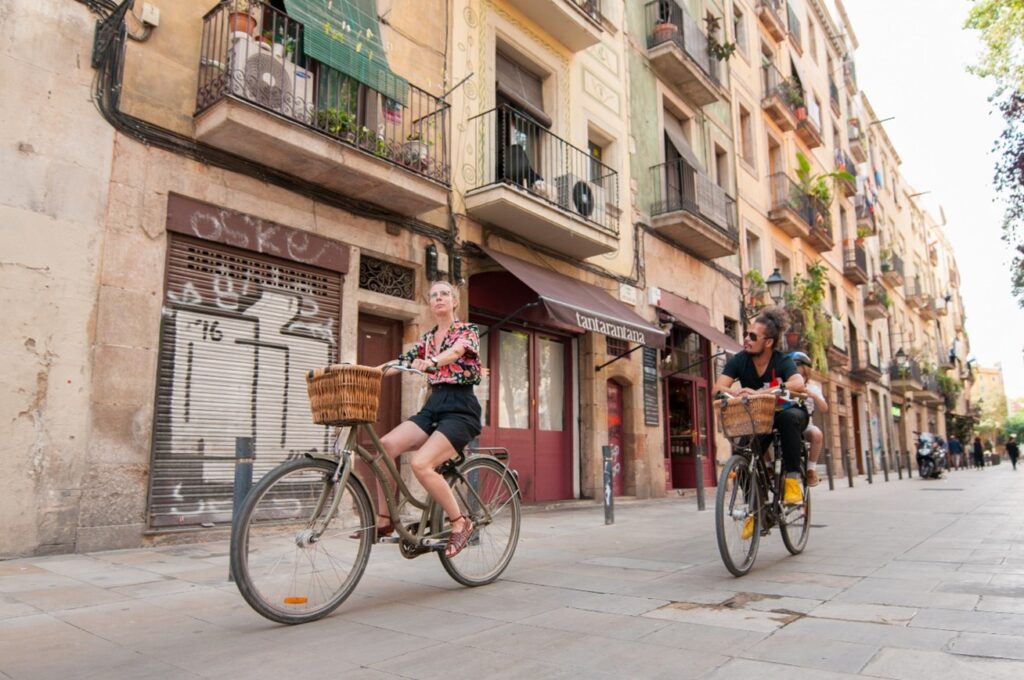A recent survey of cyclists in Barcelona reveals the main concerns faced by bike users in the city, as well as valuable insights into how these problems may be addressed. Bike theft and and motorized traffic emerged as the most pressing concerns confronted by cyclists, the results paint a clear picture of the hurdles Barcelona’s cyclists face daily. Proposed solutions mainly include improving bike infrastructure like bike lanes and parking spaces, while increasing security. The survey was conducted as part of a citizen science project and in collaboration with five ECIU Universities participating the SMART-ER research program.
In total, around 200 people participated in surveys which were conducted in several neighbourhoods of the city – in places like bike shops, parks, bike lanes, meeting point of deliverers, and at cyclist events, such as the monthly Critical Mass.

Key Challenges Faced by Cyclists
The survey identified two primary concerns among cyclists in Barcelona: bike theft and motorized traffic. Bike theft emerged as a significant problem, highlighting the need for improved security measures to safeguard cyclists’ valuable assets. Additionally, the nuisance caused by motorized traffic, particularly cars, posed a significant challenge. Other noteworthy issues included the scarcity of parking spaces, inadequate bike lane designs, obstacles on cycling routes, and the behaviour of fellow cyclists.
Proposed Solutions
To address the identified challenges, respondents strongly advocated for the expansion, enhancement, and increased safety of bike lanes. While this solution directly tackles issues related to motorized traffic and bike lane design, it does not directly address bike theft concerns. This suggests that the respondents recognize bike theft as an issue but struggle to identify possible ways of solving the problem. Respondents also highlighted the need for increased security measures, such as additional surveillance cameras, stricter law enforcement, and heavier fines for theft-related offenses. Furthermore, creating better and safer parking spaces and reducing the number of cars circulating in the city were mentioned as potential solutions.
Empowering Cyclists through Information Sharing
Interestingly, the survey findings revealed that cyclists consider themselves valuable contributors to shaping public policy on cycling in Barcelona. They expressed a willingness to share their insights and experiences with fellow cyclists. Most respondents expressed enthusiasm for a dedicated app that would facilitate the sharing of this information. Such an app could greatly enhance the cycling experience by providing real-time data on bike theft locations and the availability of secure parking spaces, among other things.
Conclusion
The surveys conducted among cyclists in Barcelona provide valuable insights into their daily challenges and concerns, ranging from bike theft to motorized traffic. The collective voice of these cyclists underscores the importance of their knowledge and participation in shaping public policy related to urban mobility and transitioning towards a low-emission environment. By recognizing cyclists as key stakeholders and leveraging their experiences, Barcelona can make informed decisions to create a more cyclist-friendly city. As the development of a community-driven platform like BiciZen unfolds, empowering cyclists to freely share information and collaborate becomes crucial. This platform, coupled with proactive measures such as expanding and improving bike lanes, enhancing security measures, and reducing car dependency, can pave the way for a safer and more enjoyable cycling experience in Barcelona. Together, cyclists and the city can forge a path towards sustainable urban mobility, benefiting both the environment and the vibrant cycling community.



